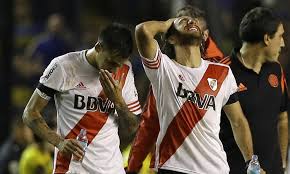February 3 – The vice-president of CONMEBOL’s disciplinary committee has resigned in protest at the governing body’s top brass reducing Boca Juniors’ stadium ban for crowd violence from eight games to two.
Heaping even more adverse publicity on the scandal-tarnished confederation, Uruguayan Adrian Leiza said his executive committee’s ruling was politically motivated.
The famous Argentine club had originally been ordered to play four home games behind closed doors and four away games without any of its fans after an incident last May when supporters attacked players of arch-rivals River Plate with mustard gas during their Copa Libertadores clash in Buenos Aires.
The controversy is the latest blow to the South American confederation, which has been at the centre of the corruption scandal enveloping FIFA.
Leiza told Argentine broadcaster TyC Sports that the reduction in Boca’s sanction was “a political decision adopted by the executive committee … It was adopted in violation of CONMEBOL statutes. It’s an illegitimate resolution.”
“In the statutes … there is no provision for granting this kind of pardon,” Leiza said. “I think there is political influence in all areas, in football too, some are more powerful than others, it’s not good.
“It doesn’t do football any good and less at this time with what South American and world football is going through.”
CONMEBOL, which appointed yet another new president, Paraguayan Alejandro Dominguez, only last month, said Tuesday’s ruling was part of its efforts to mark its centenary year. Several other clubs also received reprieves for punishments handed down last year.
“The measures were taken solely and exclusively … on the occasion of the centenary of the South American Football Confederation,” a statement said.
Venezuela doesn’t want Esquivel
Venezuela has decided not to seek the extradition of former national federation boss Rafael Esquivel, one of those still being detained in Switzerland over the US-led corruption probe.
Esquivel, who was also a member of the CONMEBOL executive committee, was among the original arrests in Zurich last May but there have been reports that his lawyers wanted him to be tried in his own country.
“It’s not true that Venezuela has requested his extradition,” chief state prosecutor Luisa Ortega told parliament. “Furthermore, we’re not going to request it.”
Swiss authorities have approved Esquivel’s extradition to the United States. His lawyers are appealing on grounds of age and poor health but his bank accounts in Venezuela have been frozen while his country carries out its own investigation.
Contact the writer of this story at moc.l1745221417labto1745221417ofdlr1745221417owedi1745221417sni@w1745221417ahsra1745221417w.wer1745221417dna1745221417

